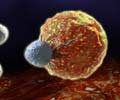A new drug currently being tested in humans has been found to suppress multiple sclerosis and other auto immune diseases in mice, according to a study published Monday.
The drug works by stimulating the development of t-cells, a kind of white blood cell which helps the immune system target specific pathogens."We know that it generates t-cell lines that are regulatory for auto immune diseases and that the same t-cell line will suppress three different auto immune diseases in mice," said study author Jack Strominger of Harvard University.
"It is also effective in several other auto immune diseases in mice, so it's possible this class of molecules could be more broadly used than simply for multiple sclerosis."
Strominger and his team developed a relative of the drug Copaxone which is currently used to treat multiple sclerosis.
They tested it on mice directly and then generated a t-cell line from those treated mice. Those t-cells suppressed the disease in three different models, he said in a telephone interview.
In testing it on mice they discovered it was "far more effective" in treating multiple sclerosis and "amazingly more effective" in treating uveitis, a common cause of blindness, he said.
Advertisement
"Mice are not man and the only way to find out whether FYAK is more effective than Copaxone is to do a clinical trial."
Advertisement
It could take years to prove if the drug is both safe and effective.
The study was published in the early edition of the Proceedings of the National Academy of Sciences.
Source-AFP
SRM/L








